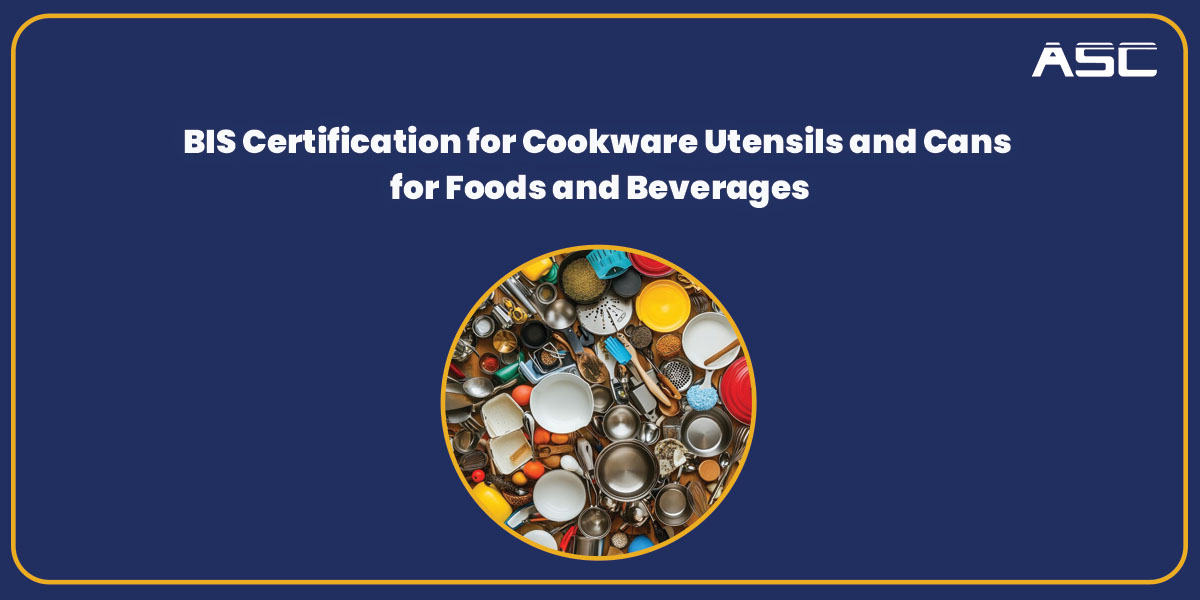BIS Certification for Cookware Utensils and Cans for Foods and Beverages

What is BIS (Bureau of Indian Standards)?
BIS is the national body in India responsible for establishing and maintaining standards for various products to promote quality and ensure consumer safety. BIS has contributed significantly to the national economy by ensuring the provision of safe, reliable, and high-quality goods; reducing health hazards to consumers; promoting exports and import substitutes; and controlling the proliferation of product varieties through standardization, certification, and testing.
The Ministry of Commerce and Industry has issued a Quality Control Order called the "Cookware, Utensils, and Cans for Foods and Beverages (Quality Control) Order 2024." This order will become effective on September 1, 2024.
According to this order, goods or articles related to cookware, utensils, and cans for foods and beverages must comply with the Indian Standard as mentioned below in the table. These products are required to bear the Standard Mark under a license from the Bureau of Indian Standards, following Scheme-1 of Schedule-II of the Bureau of Indian Standards (Conformity Assessment) Regulations, 2018. It is to be noted that, this order does not apply to goods or articles manufactured domestically for export purposes.
| Goods or articles | Indian Standard | Title of Indian Standard |
|
Cookware, Utensils and Cans for foods and beverages |
14756:2022 | Stainless Steel Utensils |
| 1660:2009 | Wrought Aluminium Utensils | |
| 13983:1994 | Stainless Steel Sinks for Domestic Purposes | |
| 9396 (Part 1): 1987 |
Round Open Top Sanitary Cans for Foods and Drinks- Tinplate |
|
| 14407:1996 | Aluminium cans for beverages |
Regarding the timeline for compliance, small enterprises, as defined under the Micro, Small and Medium Enterprises Development Act, 2006, will need to comply from December 1, 2024, while micro enterprises, as defined under the same act, will have to comply from March 1, 2025.
Additionally, articles manufactured domestically by an enterprise which are registered under the "Udyam portal" of the Ministry of Micro, Small and Medium Enterprises, with investment and turnover as specified in the order, are exempt from this order.
Please find the relevant order “Cookware, Utensils and Cans for foods and beverages (Quality Control) Order, 2024” attached below.
Benefits for BIS Certification for Cookware Utensils and Cans for Foods and Beverages
- Conformance to Standards: BIS certification ensures that stainless steel utensils adhere to the specified standards and quality requirements set by the Government of India. This guarantees their safety and reliability for consumer use, which is crucial for public health and safety. BIS certification is a mark of quality assurance, enhancing consumer confidence in the product and brand, leading to increased customer loyalty.
- Protection from Substandard Products: BIS certification protects consumers from illegal and substandard products. It ensures that products meet the quality and safety standards issued by the Government of India, safeguarding consumers against potential harm.
- Regulatory Compliance: BIS certification helps manufacturers comply with regulatory requirements, preventing penalties due to non-compliance. It ensures that businesses operate within the legal framework and maintain high standards.
- Optimum Utilization of Resources and Cost Savings: Compliance with BIS standards promotes the efficient use of resources during the manufacturing process. This can lead to more efficient production processes and result in cost savings.
Must, Check "BIS Certification for Stainless Steel Vacuum Flasks and Bottles, Insulated Container, and Insulated Flask"
Process to Get BIS Registration for Cookware Utensils and Cans for Foods and Beverages
- Understand the relevant Standard Code (IS Code) applicable to product is the initial step of BIS License. It is very important to identify the standard in which the product falls.
- Documentation that are required in BIS license before submission of application is important.
- Submission of Application- An application for the grant of license is not allowed to be submitted unless and until all the mandatory data-fields have been filled up and necessary documents and undertakings uploaded as required. It shall be mandatory for the applicant to deposit the application fee, fee for the Factory inspection and 50% of the minimum marking fee at the time of submission of application.
- Factory Inspection- The manufacturer should be ready with the required information/ clarifications/documents on the day of factory inspection. The complete technical verification of the documents shall be carried out during the factory visit.
- Sample collection and testing- The Inspecting Officer shall be required to ensure that the product sample is packed, sealed and barcoded in his presence and the barcode is recorded in the online system by taking a photograph of it. The sample will be transferred to the Laboratory Information Management System (LIMS), which will suggest the best laboratory option for the sample based on system-generated recommendations. The Inspecting Officer can either accept this recommendation or select a different laboratory, provided they record the reasons for their choice in the system.
- Grant of License- The applicant shall be required to deposit the balance 50% of Minimum marking Fee within seven days of the Grant of License.
How ASC Can Help?
Obtaining BIS registration is a crucial step towards verifying the quality and safety of your products in the Indian market. The expert team at ASC Group helps in BIS Registration for Cookware Utensils and Cans for Foods and Beverages anywhere in India with comprehensive support throughout the process specified above.
Also, Check "BIS Registration in Mumbai"

Leave a Reply